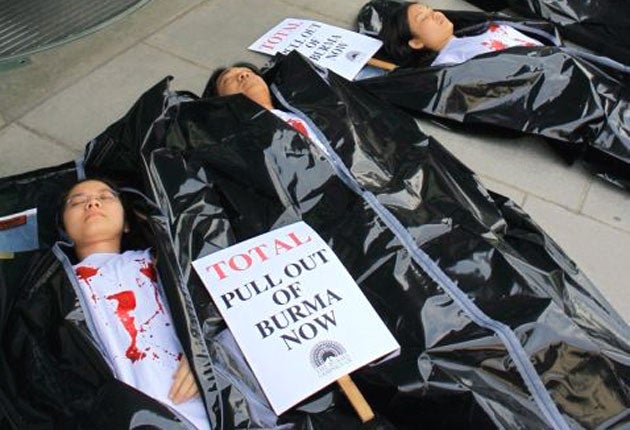Burmese villagers 'forced to work on Total pipeline'
French energy giant accused of profiting as new testimony gives shocking insight into junta's labour regime

The French energy giant Total is at the centre of allegations that Burmese villagers are being used as forced labour to help support a huge gas pipeline that is earning the country's military regime hundreds of millions of dollars.
Testimony from villagers and former soldiers gathered by human rights workers suggests that Burmese soldiers, who provide security for the Yadana pipeline on behalf of Total, are forcing thousands of people to work portering, carrying wood and repairing roads in the pipeline area. They have also been forced to build police stations and barracks.
One villager, identified pseudonymously as Htay Win Oo, told researchers from the Thailand-based human rights group EarthRights International (ERI): "Since early 2009 I've [witnessed] Burmese soldiers ... that are stationed near our village ask our village to build a new police camp. The soldiers ordered villagers to build a new camp in late March. The land where they set up the new camp belongs to local villagers ... the soldiers ordered villagers to help build it. Villagers had to cut bamboo, wood, and leaves for the building and at the same time they had to build it."
Burma's junta, the State Peace and Development Council, officially outlawed the use of forced labour in 1999. However, campaigners say troops routinely force civilians to work for them and those who refuse are often beaten, tortured or sometimes killed.
Total insists that forced labour is not used around the pipeline. On its website, the company states: "The local inhabitants around the Yadana pipeline say that they are happy to have us there. They are, above all, grateful that there is no forced labour in the area around our pipeline."
Yet such claims are not supported by the International Labour Organisation (ILO), the UN agency that works in Burma to try and stop forced labour.
Steve Marshall, an ILO spokesman, said: "It would be unfair and inaccurate to say that the pipeline area is forced-labour free. Total does not control the area, it operates it. In terms of the pipeline area, there are big areas that are outside its control. As we understand it, forced labour is still being used there by other entities, though to a much lesser extent [than in some areas]."
The evidence collected by ERI and due to be published next month suggests that villagers are routinely forced to work in various guises. One former soldier from the 273 battalion said: "We were told it was a 30-year project and the country got half and the foreigners got half of the benefit ... We ask [the villagers] to carry shell ammunition, food and supplies.
"During the portering the soldiers treat porters not so good. I do not want to mention about these bad things so much since I myself I have done it to these people as well at that time." Matthew Smith, of the ERI, said that Total was misleading the public, shareholders and investors about its impact in Burma and said the company was responsible for the abuses committed by troops guarding its project. "The evidence is unassailable that the Yadana project ushered in the Burmese army and that the Burmese army continues to provide security for the companies and the project," he said. "The company has been complicit in abuses."
The question of whether foreign companies, with an eye on Burma's riches of oil and gas, should invest in one of the world's most repressive regimes, has come into sharper focus following this week's decision by the regime to detain opposition leader Aung San Suu Kyi for a further 18 months under house arrest and the subsequent demand for tougher sanctions from campaigners.
Yet projects such as the Yadana pipeline, which transports gas from fields in the Andaman Sea through south-east Burma into Thailand, are hugely attractive to both the investors and the junta. Research suggests the regime earned $969m (£585m) from the Yadana project in 2007. Total has declined to say how much it earns.
It is not the first time Total has been at the centre of forced labour allegations in Burma. In 2005 it paid $6.12m in an out-of-court settlement after a group of villagers living near the Yadana pipeline alleged the company was involved in human rights abuses.
Last night a spokeswoman for Total said: "We are reviewing [ERI's allegations] and intend to adjust our website in the coming weeks so that it can publicly address the issues, whenever possible. It should also be noted that people in the villages around the pipeline are grateful for the fact that systematic recourse to forced labour in the area where Total operates has stopped. Such acknowledgements have been consistently repeated in front of independent experts commissioned to periodically evaluate the impact of our activities."
Join our commenting forum
Join thought-provoking conversations, follow other Independent readers and see their replies
Comments
Bookmark popover
Removed from bookmarks